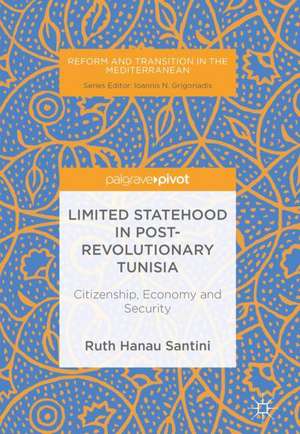Limited Statehood in Post-Revolutionary Tunisia: Citizenship, Economy and Security: Reform and Transition in the Mediterranean
Autor Ruth Hanau Santinien Limba Engleză Hardback – 23 mar 2018
| Toate formatele și edițiile | Preț | Express |
|---|---|---|
| Paperback (1) | 318.02 lei 38-45 zile | |
| Springer – feb 2019 | 318.02 lei 38-45 zile | |
| Hardback (1) | 383.50 lei 6-8 săpt. | |
| Springer International Publishing – 23 mar 2018 | 383.50 lei 6-8 săpt. |
Preț: 383.50 lei
Nou
Puncte Express: 575
Preț estimativ în valută:
73.38€ • 76.89$ • 60.66£
73.38€ • 76.89$ • 60.66£
Carte tipărită la comandă
Livrare economică 11-25 aprilie
Preluare comenzi: 021 569.72.76
Specificații
ISBN-13: 9783319744056
ISBN-10: 3319744054
Pagini: 104
Ilustrații: IX, 119 p. 1 illus.
Dimensiuni: 148 x 210 mm
Greutate: 0.31 kg
Ediția:1st ed. 2018
Editura: Springer International Publishing
Colecția Palgrave Pivot
Seria Reform and Transition in the Mediterranean
Locul publicării:Cham, Switzerland
ISBN-10: 3319744054
Pagini: 104
Ilustrații: IX, 119 p. 1 illus.
Dimensiuni: 148 x 210 mm
Greutate: 0.31 kg
Ediția:1st ed. 2018
Editura: Springer International Publishing
Colecția Palgrave Pivot
Seria Reform and Transition in the Mediterranean
Locul publicării:Cham, Switzerland
Cuprins
Chapter 1: Rethinking statehood in post-2011 Tunisia.- Chapter 2: The 2014 Constitution and citizenship.- Chapter 3: Limited statehood and contentious politics in post-2011 Tunisia.- Chapter 4: Limited statehood and Informal economy in post-2011 Tunisia.- Chapter 5: Limited statehood and security governance in post-2011.- Conclusion.
Notă biografică
Ruth Hanau Santini is Assistant Professor of Politics and International Relations at Università degli Studi di Napoli "L'Orientale", Italy. Her research deals with European foreign policy towards the Middle East and North Africa, geopolitics of the Middle East and issues of citizenship in North Africa. She was previously Visiting Fellow at The Brookings Institution in Washington DC and Associate Fellow at Johns Hopkins University, SAIS Europe.
Textul de pe ultima copertă
This book explores the complexity of the only widely-acclaimed successful democratic transition following the Arab uprisings of 2010-2011 – the Tunisian one. The country’s transformation, in terms of state-society relations across several analytical dimensions (citizenship, security, political economy, external relations), is looked at through the prism of statehood and of limited statehood in particular. The author illustrates how the balance of power and the relationship between the state and societal forces have been shaped and reshaped a number of times at key critical junctures by drawing on examples from very different policy arenas. The critical reading of statehood speaks beyond the Tunisian case study as notions of limited statehood can be applied, with different degrees of intensity and in some dimensions more than others, to most political systems in the Middle East and North Africa. Accessible for students, academics and professionals alike, the book illuminates the complexities and challenges of a successful, albeit still fragile, transition.
Caracteristici
Fills a gap in the political literature on statehood in post-2011 Tunisia Uses case studies to consider how the relationship between the state and societal forces have been reshaped Offers arguments that reflect on the entire MENA region’s evolving political systems












